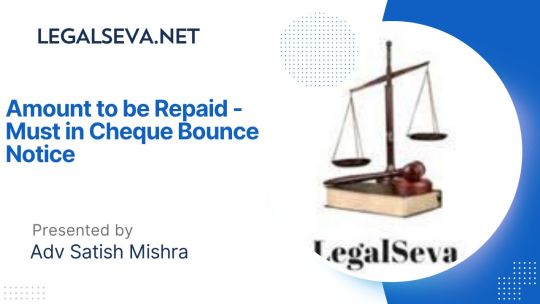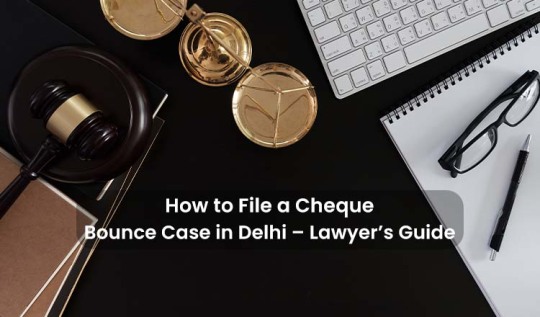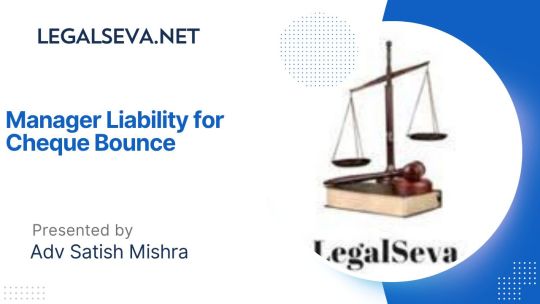#cheque bounce cases
Explore tagged Tumblr posts
Text
दिल्ली की अदालतों में फाइलों का पहाड़: कर्मचारी बोले- "हमें सजा, कैदी तो बस जेल जाते हैं" #News #HindiNews #IndiaNews #RightNewsIndia
#cheque bounce cases#court staff shortage#Delhi courts#file management issues#Judge Anju Bajaj Chandna#NI Act#Patiala House Court#pending cases#record keeper challenges#stenographer shortage
0 notes
Text
Understanding Cheque Bounce: Causes, Legal Notices, and Resolutions
In financial transactions, a cheque serves as a vital instrument for accessing bank funds. Termed a 'bill of exchange,' it demands payment on demand and is drawn by a specified banker. The individual issuing the cheque is the 'drawer,' and the recipient is the 'drawee.' Simply put, a cheque facilitates legal withdrawal from the bank, requiring the drawee's name, date, amount, and the drawer's signature.
Cheque Bounce: Causes and Implications
In the era of online transactions, cheques remain relevant, especially in substantial transactions. However, several factors can lead to a cheque bounce, from insufficient funds and signature discrepancies to post-dated issues or improper handling. The consequences of a bounced cheque include legal notices and potential penalties.
Common Reasons for Cheque Bounce:
Insufficient Balance: Transaction exceeding current account balance.
Signature Mismatch: Discrepancies in the drawer's signature.
Expired Cheque: Depositing after the 3-month validity period.
Post-Dated Cheques: Depositing before the due date.
Incomplete or Damaged Cheques: Illegible details or damages.
Legal Implications and Notices
A bounced cheque triggers legal proceedings, typically initiated by a legal notice under Section 138 of the Negotiable Instruments Act, 1881. The notice must be sent within 30 days of the cheque return, providing a 15-day window for payment. Non-compliance may result in further legal actions.
Validity of a Cheque Bounce Notice:
Drawer Details: Name and address.
Compliance with Section 138: Mentioning legal basis.
Purpose of Cheque Issuance: For debt or liability.
Bank Presentation Details: Date, reason for return.
Timely Notice: Sent within 30 days via registered post.
Responding to a Cheque Bounce Notice
Receiving a notice necessitates a prompt response or payment within 15 days to avoid legal actions. The reply, preferably from a legal advisor, should address facts, allegations, and include a summary of defense without admitting guilt.
Legal Penalties and Cautions
The consequences of a cheque bounce range from fines and imprisonment to damage to credit scores. The severity varies based on factors like the cheque amount, repeated offenses, and compliance with legal proceedings. Efficient resolution is crucial to mitigating these penalties.
Legal Penalties Include:
Monetary Fine: Double the bounced cheque amount.
Imprisonment: Up to 2 years, often coupled with fines.
Credit Score Impact: Detrimental effect on CIBIL score.
Bank Consequences: Loss of chequebook privileges.
Current Scenario and Recommendations
Cheque bounce cases contribute significantly to the backlog of legal cases in India. Fast-track courts, amendments to existing laws, and improved banking practices are recommended for expeditious resolution. The need for precision when issuing cheques is emphasized to prevent inadvertent errors leading to legal repercussions.
In conclusion, understanding the intricacies of cheque bounce cases, adhering to legal procedures, and seeking timely resolution are crucial for both drawees and drawers. Diligence in financial transactions, compliance with legal norms, and awareness of potential pitfalls can contribute to a smoother financial landscape.
0 notes
Text
Need Help With a Bounced Cheque? Here's How the Legal Process Works and Where to Find the Right Lawyer
In case of Cheque Bounce, the Law is With You
Bounced cheque is not merely a financial nuisance, but a crime in India. In case a person gave you a cheque that was dishonoured either because of lack of money in the account or the bank no longer having an account, then you can act under Section 138 of the Negotiable Instruments Act.

However, time and law actions count. That’s why people often search for the “cheque bounce lawyers near me”, because handling it right makes all the difference.
What Is the Legal Procedure for Cheque Bounce Cases in India?
This is how the process usually goes:
Legal Notice: Within 30 days after the bounce, you have to give the notice to the cheque issuer.
Wait Period: They have 15days to pay.
Filing a Case: If the amount is not paid, then they can file a complaint in the magistrate court with the assistance of a cheque bounce lawyer.
Court Process: The court can issue a summons to the accused and this is followed by the presentation of evidence, arguments and the ultimate conclusion by the court.
The Benefits of a Cheque Bounce Lawyer
Although the process seems straightforward, a good lawyer will make sure that your paperwork is sound, the deadlines are followed and that your case is taken seriously. Local experience also helps—cheque bounce lawyers near you understand how your district courts work and how to present your case better.
FAQs
Q1. Will I be able to handle my case of a cheque bounce without an attorney?
You can do it, but it is not advisable to do so. A mistake in the case may slow your case or even stop it.
Q2. Which documents are necessary to retain?
The banking return, and the cheque, and a copy of the legal notice, and evidence of delivery.
Q3. How do I find the best cheque bounce lawyers near me?
Consider bar associations in your area, directories of lawyers or a law office that handles cases involving negotiable instruments.
Q4. What is the duration of such a case?
This is usually 6 months to 1 year, but settlement can also be made sooner in cases where the accused person is willing to pay.
0 notes
Text
Amount must in Cheque Bounce Notice to be Repaid
The Delhi High Court has made it clear that the legal notice sent to a cheque drawer over dishonor of the instrument, must specifically demand the payment of ‘cheque amount’.In the absence of such demand, the preconditions to institute proceedings under Section 138 of the Negotiable Instruments Act 1881 do not stand fulfilled.Justice Amit Mahajan held, “The language of Section 138(b) of the NI…

View On WordPress
0 notes
Text

Need help with a cheque bounce case? Consult experienced Cheque Bounce Case Lawyers in Faridabad for swift legal advice, representation, and resolution
0 notes
Text

Expert Help from Best Cheque Bounce Lawyer in Delhi – Adv. Nitin Shokeen
Need guidance on cheque bounce cases? Get expert legal support from the best check bounce lawyer in Delhi—Adv. Nitin Shokeen. File with confidence!
#best advocate for divorce#best divorce lawyer in delhi#best advocate for divorce in delhi#best lawyer for divorce#top divorce lawyers in delhi#Top Bail Lawyers in Delhi#Best Advocates for Bail in Delhi#Best Bail lawyers in Delhi#Best Criminal Bail Lawyers in Delhi#Top Criminal Bail Lawyers in Delhi#Best Advocate For Cheque Bounce Case#best lawyer for cheque bounce case in delhi#Best Lawyers in Delhi for Cheque Bounce Cases#Best Cheque Bounce Lawyer in Delhi
0 notes
Text

Experienced Cheque Bounce Case Lawyers in Faridabad
Looking for expert cheque bounce case lawyers in Faridabad? Our experienced legal team provides strong representation and guidance to protect your rights. We handle cheque dishonor cases efficiently, ensuring the best legal solutions. Trust us for professional legal support. Contact us today for expert assistance in cheque bounce matters!
0 notes
Text
Ram Gopal Varma Convicted in Cheque Bounce Case
Aakhir Tak – In Shorts Bollywood director Ram Gopal Varma was convicted in a cheque bounce case. The Andheri court sentenced him to three months in jail. A non-bailable warrant was issued due to his absence in court. He was ordered to pay Rs 3.72 lakh compensation within three months. Non-payment may lead to an additional three-month imprisonment. Aakhir Tak – In Depth Conviction and…
0 notes
Text
Cheque Bounce Case Lawyer in Thane West, call us-
7028064823
Looking for an expert Cheque Bounce Case Lawyer in Thane West, Get reliable legal support to handle cheque dishonor cases effectively. With in-depth knowledge of Section 138 of the Negotiable Instruments Act, our lawyers ensure swift resolution and strong representation in court. Protect your rights—contact us today for professional assistance.
visit here

0 notes
Text
Expert Bail Lawyer in Faridabad: Ensuring Your Rights Are Protected
If you or someone you know has been arrested, securing a reliable and experienced bail lawyer in Faridabad is essential. Bail is a legal process that allows an accused person to be released from custody until their trial, and navigating this process can be complex. A skilled bail lawyer in Faridabad can guide you through the legal system, ensuring your rights are protected every step of the way.
In Faridabad, a bail lawyer's primary role is to present a strong case before the court, demonstrating why the individual should be granted bail. With deep knowledge of criminal law and the local court system, an expert advocate can help you understand the factors that influence the decision and work towards securing a favorable outcome. Whether it's for a minor offense or more serious criminal charges, a bail lawyer’s support is invaluable.
A good bail lawyer will not only work on getting you released but will also offer strategic advice on how to handle the case moving forward. They will ensure that all paperwork is filed correctly and in a timely manner, avoiding delays that could hinder the process. Moreover, they will ensure that any conditions imposed by the court are clear and manageable.
If you find yourself in need of a bail lawyer in Faridabad, it’s crucial to choose someone who understands the nuances of the local legal landscape. The best bail lawyers will offer both a compassionate approach and a steadfast commitment to fighting for your freedom.
#best lawyer in faridabad#advocate faridabad#Lawyers in Faridabad#bail applications#bail application lawyer#bail lawyer#Bail Lawyer in Faridabad#advocate bali chandigarh#divorce lawyer in faridabad#best divorce lawyer in faridabad#faridabad divorce lawyer#criminal lawyer in faridabad#criminal advocate in chandigarh#criminal lawyers in chandigarh#Personal Injury Lawyers in Faridabad#lawyer for personal injury#cheque bounce lawyer#cheque bounce lawyer in chandigarh#cheque bounce lawyers chandigarh#lawyer for cheque bounce case#Civil Lawyers in Faridabad
1 note
·
View note
Text
Manager Liability for Cheque Bounce - Legal Advice Online
The Kerala High Court has clarified the position of law under the Negotiable Instruments Act, 1882 (NI Act) that a manager of a firm cannot prefer a complaint or prosecute in his personal capacity under Section 138 if the payee of the cheque was the firm. The judgment was passed by Justice A. Badharudeen while considering a Criminal Appeal preferred by the complainant-manager challenging the…

View On WordPress
0 notes
Text

Top Divorce Lawyers in Delhi Explain Contested vs Mutual Divorce – Adv. Nitin Shokeen
Get expert insights on contested vs mutual divorce from the best divorce lawyers in Delhi. Discover which option suits your situation best.
#best advocate for divorce#best divorce lawyer in delhi#best advocate for divorce in delhi#best lawyer for divorce#top divorce lawyers in delhi#Top Bail Lawyers in Delhi#Best Advocates for Bail in Delhi#Best Bail lawyers in Delhi#Best Criminal Bail Lawyers in Delhi#Top Criminal Bail Lawyers in Delhi#Best Advocate For Cheque Bounce Case#best lawyer for cheque bounce case in delhi#Best Lawyers in Delhi for Cheque Bounce Cases#Best Cheque Bounce Lawyer in Delhi
0 notes
Text
lawyer in Nepal
Business Name : FinLex Associates
About Us : Welcome to FinLex Associates – Leading Law Firm in Kathmandu, Nepal
At FinLex Associates, we are one of the top law firms in Kathmandu, Nepal, dedicated to providing remarkable legal services that simplify the often complex legal process. Whether you are an individual or a business, our focus is to guide you through legal challenges with clarity and efficiency, reducing the stress often associated with legal matters.
From start-up businesses to established companies, and personal legal issues, our team is ready to assist you. We offer a comprehensive range of services, including business formation, contract drafting, family disputes, and property law matters. As trusted legal advisors in Kathmandu, we work to provide practical, tailored solutions that meet your unique needs.
Why Choose FinLex Associates?
What sets FinLex Associates apart is our commitment to personalized legal services. We prioritize understanding your concerns, explaining the law in clear terms, and ensuring you feel informed and confident every step of the way. Our aim is to build long-term relationships based on trust and transparency, so you can make informed decisions with peace of mind.
Comprehensive Legal Services for Businesses and Individuals
For businesses, we offer company registration, contract negotiations, and expert handling of business disputes. With deep experience in navigating Nepalese commercial law, we ensure your company is set up correctly, in full compliance with local laws, to help your business succeed.
Expertise in Corporate, Family, and Property Law
As one of the most reputable law firms in Kathmandu, FinLex Associates boasts a team of highly skilled lawyers with in-depth knowledge of both Nepalese and international laws. Whether you're dealing with straightforward matters or complex legal issues, we provide efficient, reliable legal support to help you achieve the best possible outcome.
Client Satisfaction is Our Priority
At FinLex Associates, your satisfaction is at the core of our service. We understand the stress that legal issues can bring, which is why we focus on providing timely and effective solutions. With professionalism, honesty, and personal attention, we have earned the trust and respect of clients throughout Kathmandu and beyond. Our goal is to help you resolve legal matters with as little disruption to your life or business as possible. Click here know more lawyer in Nepal
Phone Number : +9779851201490 Business full Address : Babarmahal, Kathmandu, Nepal Zip Code : 44600 Year of establishment : 2019 Country Name : Nepal
#court marriage in nepal#divorce law in Nepal#divorce process in Nepal#power of attorney#lawyer in Nepal#foreign investment in Nepal#fdi Nepal#marriage certificate in nepal#cheque bounce nepal#cheque bounce case in nepal#trademark in nepal#company registration in Nepal
0 notes
Text
Facing a Cyber Complaint in India? Here's What You Need to Know
Being accused of a cybercrime in India can feel like an overwhelming experience. With the increasing reliance on the internet for everything from social interaction to business, legal issues involving cybercrimes are becoming more common. Whether you’re facing a legitimate charge or dealing with a false complaint, knowing how to handle the situation can make a big difference in the outcome. Here’s a simple guide to help you understand what steps to take if a cyber complaint is filed against you.
1. Understand the Nature of the Complaint
Cybercrime can involve a wide range of activities, such as:
Hacking (accessing someone’s system without permission)
Online harassment (sending offensive or threatening messages)
Cyber defamation (spreading false information to harm someone’s reputation)
Identity theft (stealing personal information for fraudulent use)
Online fraud (scamming people online)
The first step is to understand what kind of cybercrime you’re being accused of. This knowledge will shape the next steps and help you plan your defense.
2. Is the Complaint False or True?
Once you know the nature of the complaint, you need to consider whether the accusation is genuine or false.
If it’s false: Cyber complaints can sometimes be used for personal revenge, misunderstandings, or even malicious intentions. If the claim against you is baseless, gather evidence that proves your innocence. You may also consider filing a counter-complaint if the accusation is intended to harm your reputation.
If it’s true: If you’ve committed the offence, it’s important to face the situation head-on. There might still be options to minimize the legal consequences. A lawyer can help you explore ways to reduce penalties, negotiate settlements, or work through the legal process more smoothly.
3. Consult a Lawyer
The complexities of cybercrime law require expert guidance. As soon as a complaint is filed against you, it’s essential to consult a lawyer who specializes in cyber law. Your lawyer will help you:
Understand the charges you’re facing
Collect necessary evidence to support your defense
Represent you during police investigations or in court
4. Cooperate with Authorities (But Be Careful)
If the police are involved, you may be asked to provide statements or documents. It’s important to cooperate, but always consult your lawyer before you say anything. Remember, statements you make can be used as evidence against you, so proceed with caution.
5. Do Not Tamper with Evidence
It can be tempting to delete messages, emails, or social media posts related to the case, but doing so can severely harm your defense. Tampering with evidence is a serious crime and will only make your situation worse. Instead, let your criminal lawyer guide you on how to handle any evidence appropriately.
6. Bank Account Freezing in Cybercrime Cases
If the cyber complaint involves financial fraud, the authorities might freeze your bank accounts to prevent further transactions. If this happens, follow these steps:
Request a formal notice from the bank to understand why your account was frozen.
Work with your lawyer to challenge the freeze if you believe it’s unjust.
Provide the necessary documents to prove your innocence and resolve the issue.
7. How Zolvit Can Help
Dealing with a cyber complaint can be stressful, but you don’t have to face it alone. Zolvit connects you with experienced cyber lawyers who can guide you through every step of the legal process. Whether the complaint is false or you’re genuinely guilty, Zolvit’s legal support can help you make informed decisions, protect your rights, and minimize potential consequences.
If you find yourself caught in a cyber complaint, don’t wait until the situation escalates. Reach out to Zolvit for professional, confidential assistance. Let us help you get the support you need to navigate through it smoothly.
Get the legal help you need today with Zolvit!
#lawyer#legal services#legal advice#criminal law#legalhelp#criminal lawyer#cheque bounce case#cheque bounce lawyers#banque cheque sending#legal news
0 notes